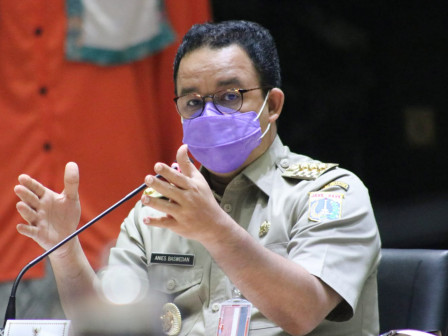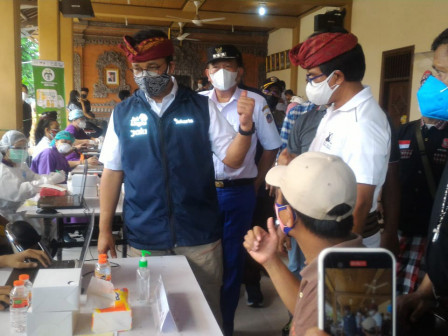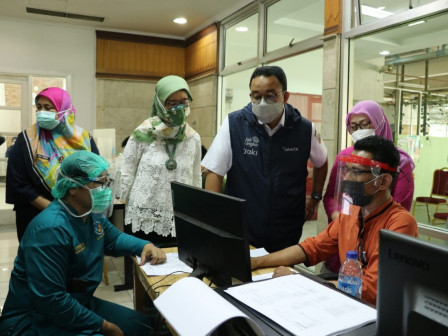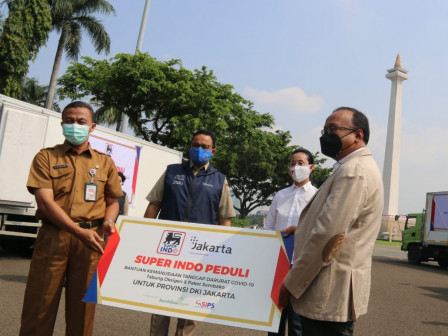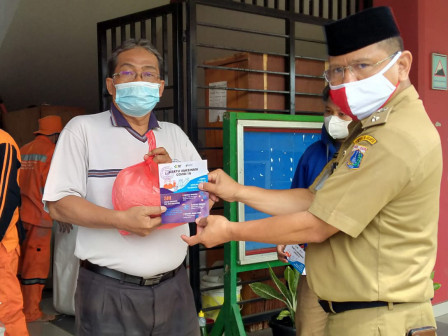Jakarta Begins to Reopen Several Sectors amid PPKM Level 4
Reported by Wuri Setyaningsih | Translated by Nugroho Adibrata
As we know, President Joko Widodo had decided to extend the emergency public activity restrictions (PPKM Level 4) to August 16 amid the ongoing surge in Covid-19 transmissions. This policy is contained in Governor's Decree number 974/2021 on PPKM Level 4, as well as Home Minister's Instruction number 30/2021 on PPKM Level 4, 3 and 2 in Java and Bali areas.
Let's get vaccinated immediately for those who haven't
In the Governor's Decree, during PPKM Level 4, people who want to conduct activities in every place or sector must have been vaccinated against Covid-19 at least the first dose. Except for those who are still within the grace period of 3 months after being confirmed Covid-19 can show evidence of laboratory results, those who are contraindicated to Covid-19 vaccination based on the results of a medical examination can show evidence of a doctor's certificate, and children less than 12 years old.
"Let's get vaccinated immediately for those who haven't, as this is a condition for activities when all sectors are slowly opening. So no need to worry anymore as we are now protected by the vaccine. Prepare proof of the vaccine by downloading it via JAKI application or at PeduliLindungi.id. Stay disciplined, maintain health protocols and be vigilant. We must keep trying and praying so that this pandemic can pass," expressed Jakarta Governor, Anies Baswedan, as quoted by Jakarta PPID's press release, Wednesday (8/11).
Joint Officer Holds PPKM Monitoring while Promoting VaccinationThus far, some sectors had been opened. They were malls, outdoor sports facilities, as well as worship activities with applicable regulations.
As for the information, the implementation of the Covid-19 health protocol and the enforcement of sanctions in this Governor's Decree is carried out in accordance with the provisions in Gubernatorial Regulation number 3/2021 on Implementing Regulations of Bylaw number 2/2020 on Covid-19 handling.
Below are the types of restrictions applied in the extension of PPKM Level 4:
1. Activities at work/office
- Non-essential sectors:
100% Work From Home (WFH)
- The essential sectors of finance and banking only include insurance, banks, pawnshops, pension funds, and financial institutions that are oriented to physical services with customers:
a. 50% Work From Office (WFO) is for locations related to public services under stricter health protocols; and
b. 25% WFO is for office administration services to support operations under stricter health protocols
- Essential sectors:
a. Capital market (which is oriented towards customer service and the good operation of the capital market)
b. Information and communication technology includes cellular operators, data centers, internet, postal services, media related to the dissemination of information to the public
c. Hotels with non-treatment of Covid-19: 50% WFO is applied under stricter health protocols
- Essential sectors of export orientation industry where the company must show proof of sample documents for Export Declaration of Goods (PEB) for the last 12 months or other documents showing export plans and are required to have an Operational Permit and Mobility of Industrial Activities (IOMKI):
a. 50% WFO is applied only in production facilities/factories under stricter implementation of health protocols; and
b. 10% WFO is for office administration services to support operations under stricter health protocols
- 25% WFO is for essential sectors in the government sector that provide public services that cannot be delayed, with stricter health protocols
- Critical sectors:
a. Health; and b. security and order:
They must be 100% WFO under stricter health protocols
- Critical sectors:
a. Disaster management; b. energy; c. logistics, transportation, and distribution, especially for the basic needs of the community; d. food and drink and e. its supports, including for livestock/pets; f. fertilizers and petrochemicals; g. cement and building materials; h. national vital object, i. national strategic projects; j. construction (public infrastructure); and K. basic utilities (electricity, water, and waste management):
b.100% WFO is for production/construction facilities/services to the community, with stricter implementation of health protocols; and
c. 25% WFO is for office administration services to support operations under stricter health protocols
2. Teaching and Learning Activities
- School/College/Academy/Education/Training Place:
Must be online.
3. Activities in the Daily Needs Sector
a. Supermarkets, traditional markets, and people's markets that sell daily necessities: Only open until 8 PM with 50% visitor capacity, under stricter health protocols, especially for main markets can operate according to operating hours
b. Traditional markets: Only open until 3 PM with 50% visitor capacity, under stricter health protocols, especially for wholesale markets that can operate according to operating hours
c. Pharmacies and drug stores: Open for 24 hours, under stricter health protocols
d. Street vendors, grocery stores, voucher agents/outlets, barbershops, laundry, hawkers, small workshops, vehicle washes and others like: Only open until 8 PM, under stricter health protocols
4. Eating/Drinking Activities in Public Places
a. Food stalls/warteg, street vendors, hawker stalls and the like: Only open until 8 PM with a maximum of 3 visitors and a maximum meal time of 20 minutes under stricter health protocols
b. Restaurants and cafes located in closed buildings/shops, either in separate locations or in shopping centers/malls: Only welcoming delivery/take away and do not accept dine-in
c. Restaurants, cafes with service areas in open spaces: Allowed to open and operating hours until 8 PM with a maximum capacity of 25%, one table for a maximum of two people, and a maximum meal time 20 minutes.
5. Activities at Shopping Centers/Malls/Trade Centers
a. Shopping center/mall/trade center: Allowed to operate 25% from 10 AM to 8 PM under the health protocol regulated by the Ministry of Trade; and
b. People under 12 years old and above 70 years old are prohibited from entering shopping centers/malls/trade centers; and
c. Cinemas, children's playgrounds and entertainment venues within shopping centers/malls/trade centers are closed
6. Construction Activities
- Construction sites for public infrastructure (construction sites and project sites):
Operating 100% with operating hours, capacity settings, under stricter health protocols
7. Worship Activities
- Places of worship (mosques, prayer rooms, churches, temples, and pagodas and other places that function as places of worship): Maximum 25% capacity or 20 people by observing stricter health protocols and/or technical arrangements from the Ministry of Religion
8. Activities at Health Service Facilities
- Health care facilities: Operating 100%, under stricter health protocols
9. Activities in Public Areas and Other Places that trigger Crowds
- Public areas, public parks, public tourist attractions and other public areas: Temporarily closed
- Wedding Reception Venue: Temporarily suspended
- Locations for arts, culture, sports facilities, and social activities that can cause crowds and crowds: Temporarily closed
- Sports Facilities:
a. Temporarily closed
b. Especially for sports facilities in open spaces, they can operate with the following conditions:
1. Operating hours until 8 PM
2. Without an audience; and
3. Stricter implementation of health protocols.
10. Activities on the Mode of Transportation
- Public Vehicles, Mass Transportation, Taxis (Conventional and Online) and Rental Vehicles: Maximum 50% passengers of capacity, under stricter health protocols
- Ojek (Online and Pool): 100% passengers of capacity, under stricter health protocols

